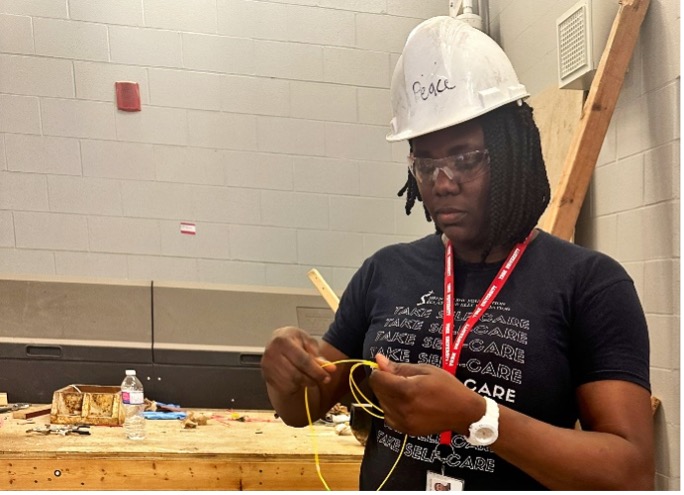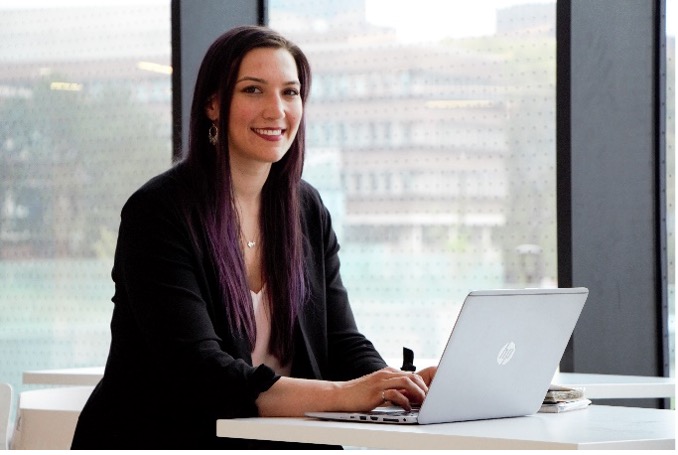
From the Civil Engineering department at York University’s Lassonde School of Engineering, current student Peace Ikpotokin and recent graduate Josephine Morgenroth represent the intent of International Women in Engineering Day, celebrated annually in late June, to draw attention to women changing the face of engineering and the world's future.

Ikpotokin, who is in the final year of her master’s degree at Lassonde, conducts research with Liam Butler, assistant professor in the Department of Civil Engineering, focused on monitoring the distributed strain behaviour of two-way slabs produced with low-carbon concrete. The production of concrete poses a major problem for the world, accounting for 7 per cent of carbon dioxide emissions globally.
Ikpotokin’s research aims to find solutions to this growing issue with environmentally friendly alternatives to conventional concrete.

Morgenroth, who completed her PhD in civil engineering at Lassonde under the supervision of Associate Professor Matthew Perras and Associate Professor Usman Khan, researched combining disciplines of machine learning and rock engineering to predict geotechnical behaviour underground.
Contributing knowledge to an emerging field, her work aims to enhance the underground rock engineering design of structures such as tunnels, in a way that is useful for practical rock engineers.
Both graduates have garnered significant accolades. Ikpotokin has received the Professional Engineers Ontario (PEO) International Peace Scholarship, American Association of University Women (AAUW) Scholarship and numerous certificates acknowledging her leadership efforts. She is also a highly active member of the Society of Women Engineers (SWE), an organization that empowers women to achieve their full potential in engineering. Morgenroth has been awarded the Professor Doug Stead PhD Thesis Award from the Canadian Rock Mechanics Association, NSERC Alexander Graham Bell Canada Graduate Scholarship and Joan Bath Award for Advancement of Mineral Industry.
Ikpotokin and Morgenroth have made an impact too on the industry. Following her undergraduate studies, Ikpotokin began working in the industry as a site engineer, structural engineer and supervisor for various building and construction projects. Morgenroth works as technical services manager at digital mining company RockMass Technologies, supports clients by coordinating fieldwork and providing expertise to help implement solutions for rock engineering problems.
Together their efforts are indicative of a shift in the engineering field. Over the past decades, Canada has experienced its largest growth of women in post-secondary engineering programs and professions through the support of various organizations, events and campaigns addressing underrepresentation. However, with women making up a meagre 14 per cent of practicing engineers in Canada, there is still a need for improvement.
“There was actually a lot of women representation in grad school, but not so much in the mining industry,” Morgenroth says.
Ikpotokin agrees. “There is a low number of women in engineering, the gap is very clear,” she says. “It would be nice to have more peer support and female students. It’s really satisfying and empowering to work alongside other women.”
Despite the need of improvement, there are signs of progress – and hope. Both engineers credit the immense support they received from their Lassonde research and PhD supervisors to contribute pivotal knowledge to novel fields of research. Furthermore, Morgenroth is seeing change through companies like the one that employees her. “Our CEO is a woman of colour, and a lot of our team members are women too. We can talk about someone’s wedding at lunch, and then get into rock mechanics right after – it’s great.”
Looking to the future, it’s situations like hers that are important to highlight, which is why representatives like Morgenroth and Ikpotokin are so important. It’s also why Morgenroth ensures to use her platform to inspire and motivate women in engineering through various talks at Lassonde. “Representation is important in fields like engineering,” says Morgenroth. “Diversity breeds innovation and challenges people to think differently.”
